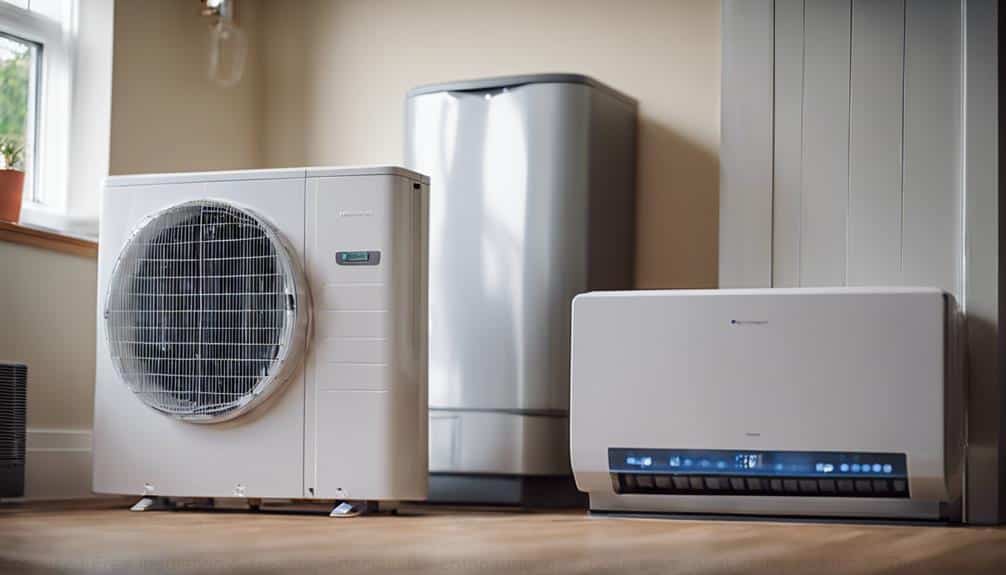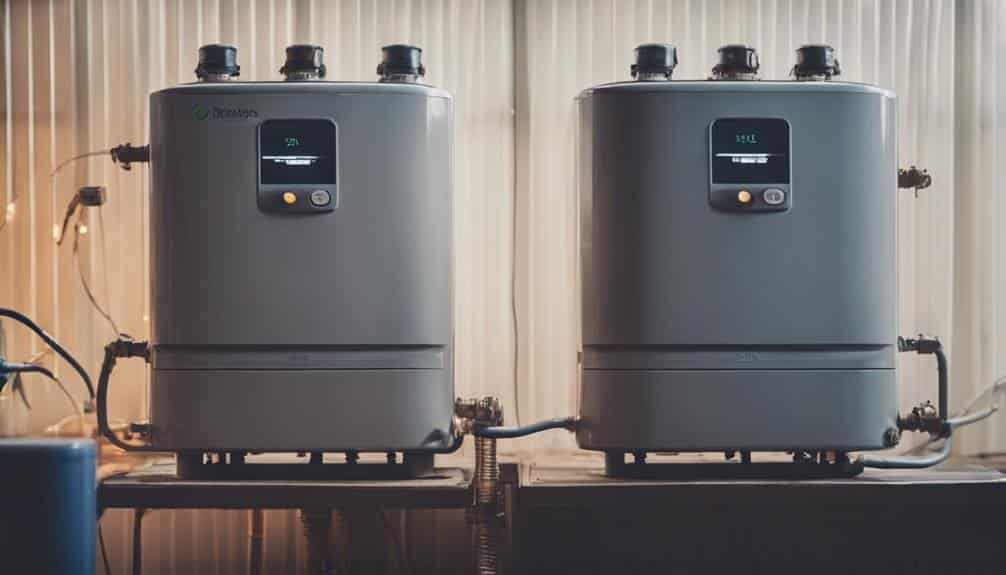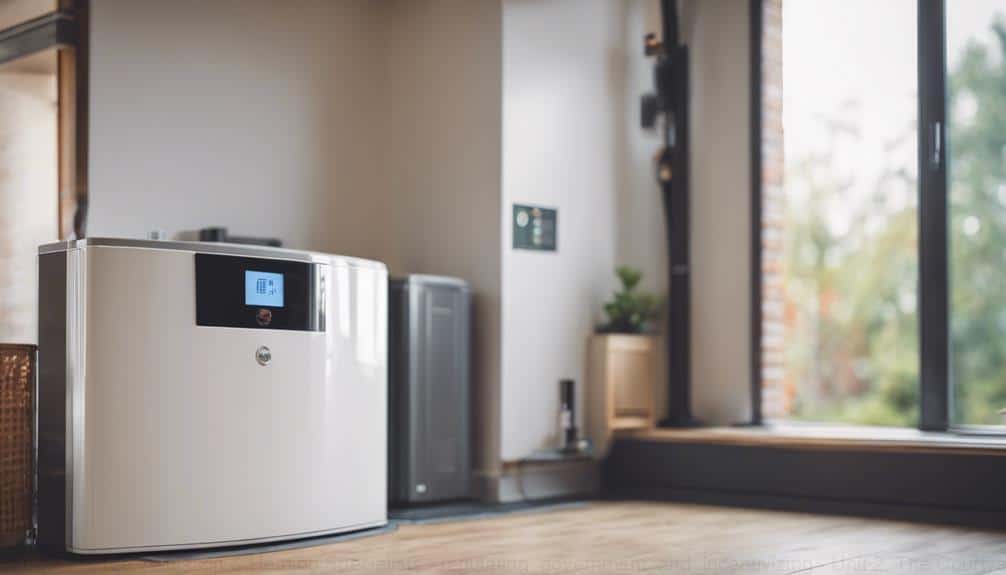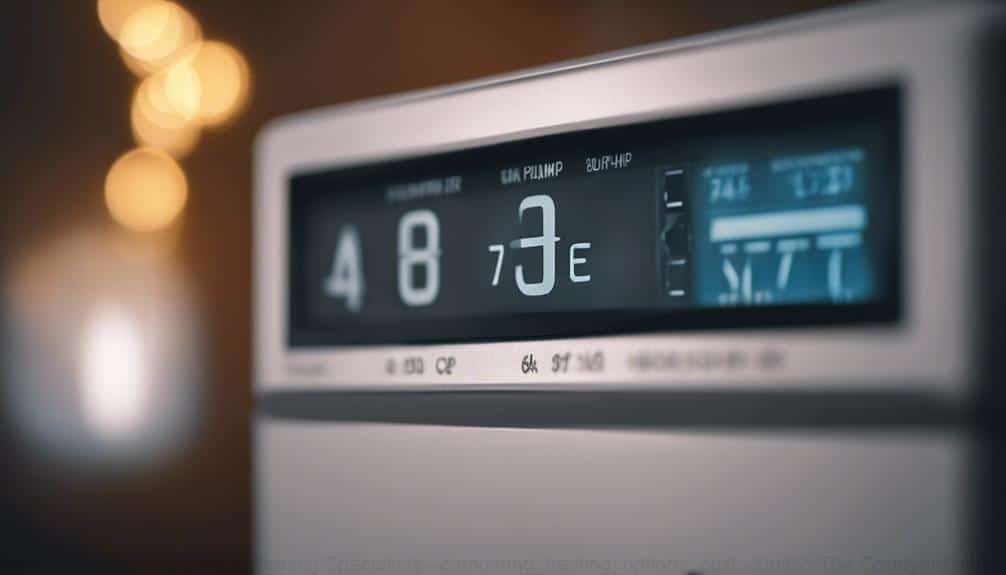In the UK, when comparing gas boilers and heat pumps for heating, factors to consider include efficiency, cost, installation ease, environmental impact, heating performance, and compliance with government regulations and incentives.
Gas boilers provide quick heat but require more maintenance compared to heat pumps, which operate at lower temperatures and produce zero-carbon emissions.
Installation times may vary based on professional availability. Heat pumps are aligned with sustainability goals and anticipated future regulations.
Differences in performance affect energy consumption and carbon footprint. Further exploration is recommended to determine the most suitable heating solution based on individual needs.
Table of Contents
ToggleEfficiency & Cost: Gas Boilers Vs Heat Pumps

When comparing gas boilers to heat pumps, gas boilers have an average annual energy requirement of 13,600 kWh, while heat pumps operate on electricity sourced from different percentages of electricity and air/ground.
Gas boilers have simpler maintenance needs compared to heat pumps. Gas boilers offer quick and consistent heat output with a flow temperature of around 70°C.
In contrast, heat pumps operate at lower output temperatures, making them suitable for well-insulated homes. These differences in energy consumption and maintenance highlight the varying efficiencies and costs between gas boilers and heat pumps.
Installation Complexity & Time
Gas boiler installations are known for their quick and straightforward process compared to heat pump installations. The availability of numerous well-trained gas boiler installers ensures efficient and timely installations.
In contrast, the scarcity of qualified professionals proficient in heat pump technology can lead to delays in installations, potentially affecting customer satisfaction. Researching and selecting installers with the necessary qualifications and positive reviews is crucial for a smooth and satisfactory heat pump installation experience.
Prioritizing installer qualifications and training significantly impacts the overall outcome of transitioning to a heat pump system.
Carbon Footprint & Environmental Impact

When comparing gas boilers to heat pumps, it's crucial to consider the environmental impact. Here are some key factors to keep in mind:
- Renewable Energy Sources: Heat pumps use electricity, with a significant portion in the UK from renewables, reducing carbon emissions.
- Sustainability Practices: Heat pumps operate without burning fossil fuels, making them zero-carbon heating appliances and aligning with sustainable practices.
- Efficiency Benefits: Upgrading to a modern heat pump from an old boiler can lead to substantial annual CO2 savings, promoting a greener approach to home heating.
Performance & Heating Output Comparison
Gas boilers have a high and consistent heat output, operating at a flow temperature of around 70°C, suitable for quickly heating spaces.
In comparison, air source heat pumps run at lower temperatures, with radiators at 35-45°C and hot water at 55°C. Air-source heat pumps achieve about 300% efficiency, making them more efficient than gas boilers.
The difference in performance impacts heating dynamics, energy usage, and carbon footprint, with implications for climate change.
Government Regulations & Incentives

The UK government plans to prohibit new gas boilers in new builds starting from 2025 and in all domestic properties starting from 2035.
Heat pumps and hydrogen boilers are potential alternatives to gas boilers.
A government subsidy of £7,500 is available for heat pump installations.
Future Trends in UK Heating Systems
In the UK, heat pumps are increasingly popular as sustainable and efficient heating systems. Energy saving strategies and renewable energy solutions are driving this shift towards greener alternatives. With the government's focus on reducing carbon emissions, heat pumps are considered crucial for the future of heating systems.
Investing in renewable energy solutions like heat pumps not only benefits the environment but also results in long-term cost savings. As the demand for eco-friendly heating options rises, more homeowners are likely to choose energy-efficient alternatives such as heat pumps to reduce their carbon footprint and contribute to a more sustainable future.
Price Analysis: Gas Boilers Vs Heat Pumps

When comparing gas boilers and heat pumps for heating systems, note that gas boilers have lower upfront costs. However, heat pumps are more efficient in converting energy into heat.
Despite higher initial prices, heat pumps can lead to long-term energy savings.
Suitability for Different Home Types
Energy consumption analysis is crucial for determining the suitability of gas boilers or heat pumps based on factors such as insulation levels and heating requirements. Gas boilers are ideal for homes with lower insulation levels due to their high and consistent heat output, quickly warming up spaces. In contrast, heat pumps are more efficient in well-insulated properties because of their lower output temperatures.
Retrofitting challenges may arise when installing heat pumps in older homes that require upgrades to meet system demands. Evaluating your home's insulation and heating needs is essential when choosing between gas boilers and heat pumps.
Frequently Asked Questions
Are There Any Available Grants for Replacing Gas Boilers With Heat Pumps in the Uk?
Government incentives in the UK support the replacement of gas boilers with heat pumps. These grants aid in energy cost savings and reducing carbon footprint by transitioning to eco-friendly heating solutions.
How Can Homeowners Improve the Efficiency of Heat Pumps in Older Properties?
Enhancing insulation in older properties can significantly improve the efficiency of heat pumps. This retrofitting option helps in retaining heat, reducing energy consumption, and enhancing the performance of heat pumps. By making these insulation improvements, your home can become more comfortable and cost-effective.
What Are the Long-Term Maintenance Costs for Gas Boilers Compared to Heat Pumps?
Gas boilers generally have lower initial costs, but higher long-term energy expenses and carbon emissions. In contrast, heat pumps may require a larger upfront investment, but offer increased energy efficiency, cost savings, and environmental advantages over time.
Will the Ban on Gas Boilers in the UK Affect Property Values?
The UK's ban on gas boilers may impact property values. Consider investing in energy-efficient alternatives like heat pumps for long-term savings and eco-friendly benefits. This change can affect your investment and energy expenses significantly.
How Can Homeowners Assess the Suitability of Heat Pumps for Their Specific Property Type?
Assessing the suitability of a heat pump for your home involves evaluating the quality of insulation and energy usage. Consider the property specifics to determine if ground source or air source pumps are viable options. Consult professionals for accurate recommendations tailored to your specific needs.



